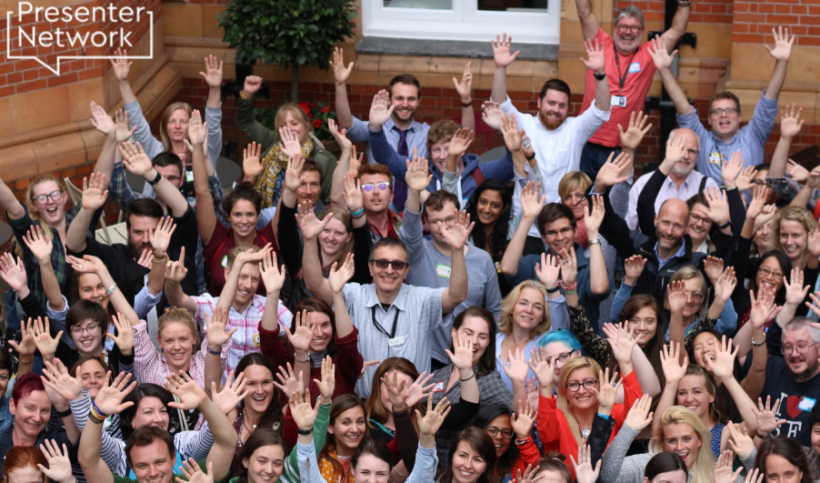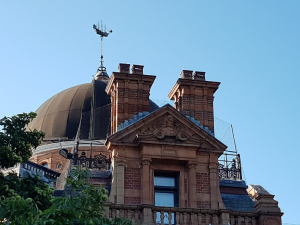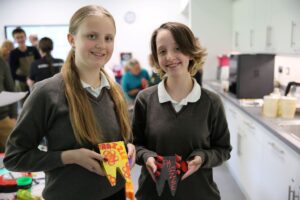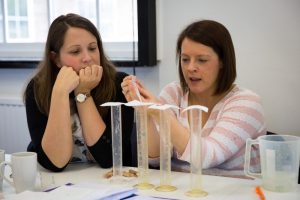What’s your elephant? Top tips a presenter never forgets
Monday 1st October 2018

Oxford Presenter Network Hub leader, chemistry buff, science communicator and Science Oxford Events Officer Rowena Fletcher Wood shares a few tips and highlights from the recent Presenter Network Conference, a local, national and international network set up for presenters to share best and worst practice.
For Anna Ploszajski, Oxford’s 2017 Regional FameLab winner, it’s her Polish surname. When you get on stage, there’ll be something about you that people notice, which leaves them wondering “Does she know?” (…She probably does.)
 Of course, there are lots of things we have to do first thing as presenters once we step in front of our audience, but in her short talk at the Presenter Network Conference held at the Greenwich Observatory this September, Anna had one more to add to the list: address the elephant in the room. Every presenter has one – something quirky or unexpected that, if not addressed, could leave your audience distracted for your whole presentation.
Of course, there are lots of things we have to do first thing as presenters once we step in front of our audience, but in her short talk at the Presenter Network Conference held at the Greenwich Observatory this September, Anna had one more to add to the list: address the elephant in the room. Every presenter has one – something quirky or unexpected that, if not addressed, could leave your audience distracted for your whole presentation.
Perhaps a little easier if, like Greg Brown and Dhara Patel, the lights are out. Standing at the back of a room full of presenters, they undertook the unenviable task of showing off their craft. With two space stories woven into one, they took us on an adventure through the cosmos, through the constellation that looks like the Macdonald’s M to the suspiciously long-tailed big and little bear, and through the rapidly diminishing rings of Saturn as the universe changes before our very eyes.
Or does it? Space is usually incredibly visual, but blind astronomer Nic Bonne from the Institute of Cosmology and Gravitation, University of Portsmouth, is developing the Tactile Universe project for working with people with visual impairments, a 3D-printed set of textural tools to explore telescopic images of space. The higher light density, the more raised the surface. Now, with only the power of touch, would-be astronomers can ‘see’ galaxies for the first time, and shed some light on the fabric of the universe.
He also had some handy tips for improving PowerPoint presentations. Did you know that light grey on dark blue is the best contrast for the visually impaired? And that text over images or video is a no-no? For more tips on making your presentations more inclusive, see https://help.rnib.org.uk/
We brought back lots of ideas to Oxford to share with presenters who lecture, run events, or are just straight on mad inventors getting together to talk best – and worst – practice at our first Presenter Network Hub meeting at the Oxford Centre for Innovation on 27 September.
In our opening hub session, “Presenting 101” tested our presenters’ ability to talk for one minute about a random word (I got “flowers”) and get to know the others in the room. We tackled difficult questions, difficult audiences, and shared our expectations. We were also joined by Presenter Network Coordinator Liz Avery who offered some of her own insights gleamed from setting up the other hubs.
Have your own ideas for a skills-sharing session? Or want to request some training that would make a difference to your presenting? Sign up to the Oxford Hub to be kept up to date with training opportunities (3 or 4 times a year) and contact [email protected]with ideas and queries!
Check out our Science Cabaret (18 October) part of the Science Oxford supported IF Oxford Science and Ideas Festival, where some of our most talented science presenters riff off the theme A Little Knowledge Is – A Dangerous Thing? Featuring Chris Lintott from BBC Sky at Night, Alison Woollard, a Royal Institution Christmas Lecturer, and Lucy Rogers from Robot Wars, plus digital troublemaker Terence Eden, maths folk singer Kyle Evans and zoologist Joanna Bagniewska and our compere, Helen Arney. (Pay What You Decide).
Visit www.if-oxford.com for over 100 science inspired events for all the family across the rest of the festival!



